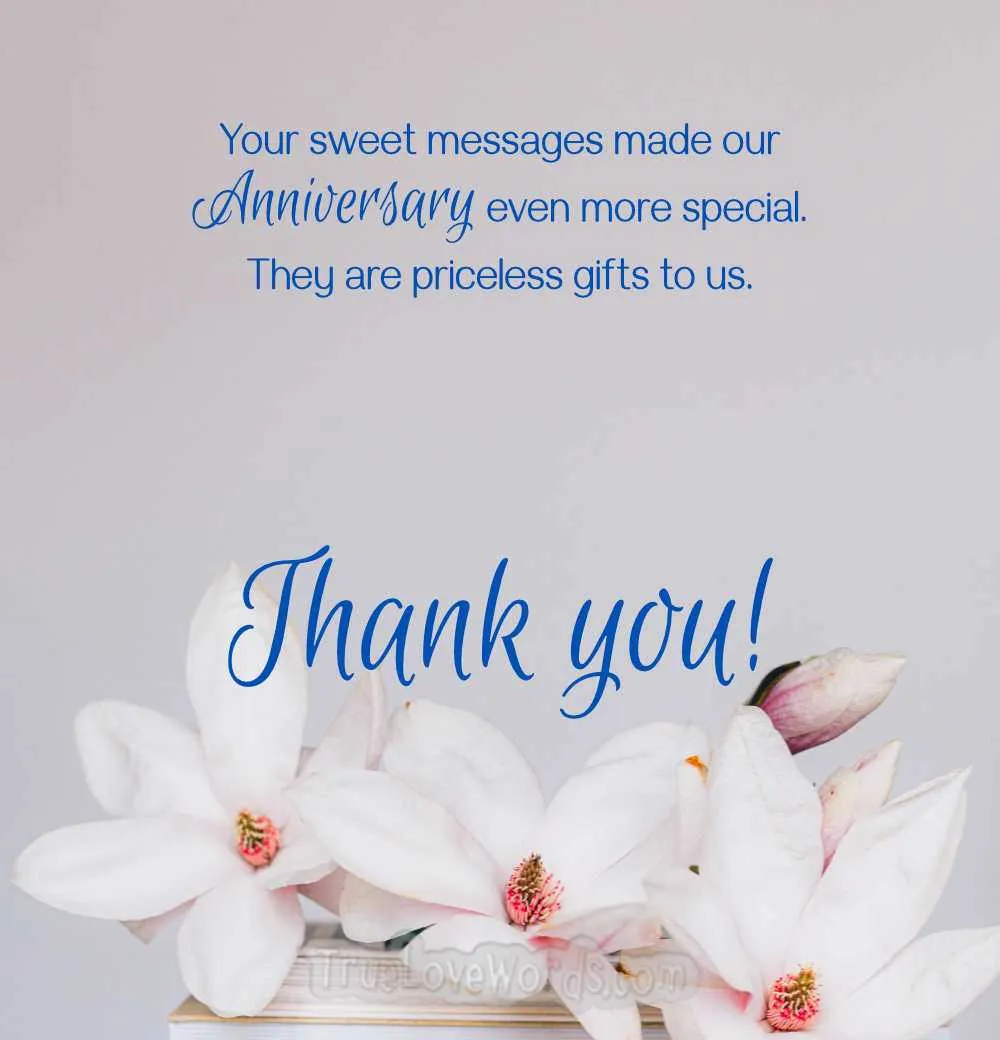Heartfelt Thank You Messages to Respond to Anniversary Wishes

Reply with a short, personal note that mentions the specific occasion. A simple message like “Thank you for the lovely anniversary wishes–your words made our day even more special” works well. Mention names if the message comes from close friends or family.
If someone wrote a longer or heartfelt note, match their tone. You could say, “We truly appreciated your kind words and thoughtful message. It means a lot to us to have you in our lives”. Keep it natural–no need for formal phrasing or excessive detail.
For colleagues or acquaintances, stay polite and light. Try “Thanks so much for your kind anniversary wishes–really appreciated!” Short messages work best for social media replies or group chats.
If you received a gift along with the message, mention it directly: “Thank you for the warm wishes and the beautiful flowers–such a thoughtful gesture”. Specificity adds warmth without length.
Keep each reply consistent with your tone and relationship to the sender. The goal is acknowledgment with sincerity, not formality. Write like you speak–clear, friendly, and to the point.
Best Thank You Message for Anniversary Wishes
Reply directly and personally. Mention the sender’s name if possible. Short messages work best when they sound natural and sincere. Use these specific examples as a base:
- “Thank you, Sarah! Your message made our day even better. So glad to have friends like you.”
- “Appreciate your kind words, James. We had a great celebration and your wishes added to the joy.”
- “Thanks for the thoughtful message, Priya. It means a lot to both of us.”
Group messages need a slightly different tone. Keep it warm and inclusive:
- “To everyone who sent wishes–thank you! We read every single message and felt truly loved.”
- “Grateful for all the kind words on our anniversary. Your messages brought smiles all day.”
Avoid overused phrases. Focus on the specific feeling the message gave you–joy, comfort, or surprise. Tailor your reply to reflect that. If you’re responding on social media, keep it simple but personal. Add a photo if it feels right, but don’t force it.
How to Personalize Your Thank You Message
Mention the specific gift, gesture, or message you received. For example: “Your handwritten note meant a lot to us.” This shows the sender their effort didn’t go unnoticed.
Use the person’s name. A direct address like “Thank you, Sarah, for your thoughtful message” creates a warm, genuine tone.
Add a short personal detail or memory if possible. If they attended your celebration, mention a moment: “We loved catching up during dinner – your story about Venice still makes us laugh.”
Keep your tone conversational. Write as if you’re speaking directly to them. Avoid formal phrasing that feels generic or distant.
Include a closing note that feels open and natural. Instead of a standard sign-off, try “Let’s plan coffee soon” or “Hope to see you again soon” – it keeps the connection going.
Creative Ways to Express Gratitude for Anniversary Wishes
Send a personalized voice message through a messaging app. Mention the person’s name, recall a shared memory, and express genuine appreciation. This adds warmth that a text can’t convey.
Create a short video with clips or photos from your anniversary and add captions thanking everyone who reached out. Tag them if you’re sharing it on social media.
Write a handwritten note for close friends and family. Use specific references to their messages, and consider mailing it with a printed photo from your celebration.
Host a casual thank-you livestream. Keep it light, address people by name, and share a few moments from your day. This works well for a large group of well-wishers.
Use Stories on Instagram or Facebook to post individual shoutouts. Add a sticker or GIF, say a few words, and keep it spontaneous to make each one feel personal.
Create a collage of the messages and print it as a keepsake. Take a photo and send it to the people who contributed, letting them know how much their words meant.
Reply with a meme or a custom GIF that matches your humor. Keep it personal and aligned with how you usually interact with that person.
If you received messages from coworkers or clients, thank them during a meeting or via professional chat, keeping the tone warm and brief.
Send a group message or email, but make it visual. Include a photo, use each person’s name once, and skip generic phrasing.
Common Mistakes to Avoid When Saying Thank You for Anniversary Wishes
Avoid sending one generic message to everyone. Personalize your replies where possible, especially if someone took time to write something thoughtful or unique. A simple “Thanks!” may seem dismissive if the message you received was heartfelt.
Skip automated responses. They often sound cold and impersonal. If you’re using social media, reply individually to comments rather than posting a single blanket thank you. It shows more appreciation and effort.
Don’t delay your response for days. Acknowledge the wishes within 24 to 48 hours. Longer than that feels like an afterthought. If you’re overwhelmed, a short but sincere message works better than silence.
Avoid overly formal or stiff language. Write like you speak. A casual, kind tone feels more genuine than anything too polished or rehearsed.
Don’t forget people who sent you private messages. It’s easy to focus only on public posts, but skipping direct messages or emails may leave some people feeling ignored.
Be specific if you can. Instead of saying “Thanks for the wishes,” say “Thank you for your kind message – it made our day brighter.” Small details show you paid attention.
Skip sarcasm or humor that might not land well. Anniversary messages are often sincere, and jokes can be misunderstood, especially in text form.
Lastly, don’t use the opportunity to promote anything. Keep your message focused on gratitude. Turning it into a sales pitch or announcement can feel inappropriate.